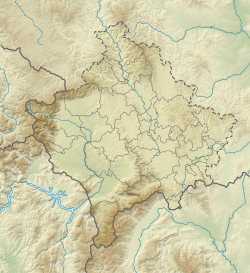Crnoljeva
This article does not cite any sources. (November 2007) |
| Crnoljeva | |
|---|---|
| Albanian: Carralevë | |
 Crnoljeva Location in Kosovo | |
| Highest point | |
| Elevation | 1,055 m (3,461 ft) |
| Coordinates | 42°27′00″N 20°53′00″E / 42.45°N 20.883333°ECoordinates: 42°27���00″N 20°53′00″E / 42.45°N 20.883333°E |
| Geography | |
| Location | Kosovo |
Crnoljeva (Serbian Cyrillic: Црнољева; Albanian: Carralevë or Mali i Carralevës) is a mountain in central Kosovo[a], dividing its two main geographical regions, the Kosovo Plain and Metohija. Crnoljeva is also a point where all three drainage basins of Kosovo (and three out of four in the Balkans) meet, making the mountain a major hydrographic knot. It is named after the village of .
Crnoljeva is located in the south-central part of Kosovo, between the valleys of the rivers Drenica (to the east) and and (to the west). The mountain is elongated in the north–south direction and divides the of Metohija from the Drenica region of the Kosovo Plain. The highest peak is Topila (1,177 m), while the Drmanska glava peak (926 m) is point of the hydrographic knot. Another prominent peak is the Korenik (1,142 m).
Crnoljeva is rich in ores, most notably the chromium, magnesite and coal. Right through the middle of the mountain goes the regional Ferizaj-Prizren road, using the natural route of the Carralevë river valley.
Some rivers originating from the mountain are:
- Drenica, Topila and Crnoljeva; through the Sitnica they drain the area into the Black Sea;
- Nerodimka; through the Lepenac it drains the area into the Aegean Sea;
- Banja, Mirusha and Toplluha; through the White Drin they drain the area into the Adriatic Sea;
Larger settlements around the Crnoljeva are Štimlje (east), Suva Reka, Bllacë, Banja, Mališevo (west), Lapušnik, Komorane (north) and Crnoljevo (east).
Notes[]
| a. | ^ Kosovo is the subject of a territorial dispute between the Republic of Kosovo and the Republic of Serbia. The Republic of Kosovo unilaterally declared independence on 17 February 2008. Serbia continues to claim it as a part of its own sovereign territory. The two governments began to normalise relations in 2013, as part of the 2013 Brussels Agreement. Kosovo is currently recognised as an independent state by 97 out of the 193 United Nations member states. In total, 112 UN member states have recognised Kosovo at some point, of which 15 states later withdrew their recognition. |
References[]
- Kosovo geography stubs
- Mountains of Kosovo

